
Back when the author Alex Haley documented the journey of his family roots, from Africa to a slave ship, to the Americas and the slave auction block. The unfolding of that information led him on a journey of adventure that he would eventually transform into his book titled Roots. With the help of Ancestors-dot-com, I was driven to learn more about my own family's African-American roots. I have to admit that my journey in search of my family's roots has been bewilderingly exciting. I have learned that you will need some C.S.I., investigative skills because you will have to overcome some of the family stories you have grown up with in order to embrace some of the cold hard facts that have a tendency to appear before you in the US census reports from long ago. A good example of this is while exploring my mother's side of the family things seemed pretty straightforward. There was an ancestor by the name of Celie, just like the character name in the movie Color Purple (I kid you NOT) who was a slave. She was given to the slave owner's daughter as a wedding present and from Celie, I was able to track solid family connections from 1855 to the present time.
My father's side of the family needed all of my detective skills which were very close to zero. But persistence and a lot of luck paid off. My father's side of the family just seemed to pop into existence with no prior history that was until I finally ran across a census report where I found all of my father's family names as they appeared on a later census only on this census the entire family was listed as white. Tracing that family line back from the time my father's family first appeared in my research filled in all the blanks. My search was based on all the information I had collected from older family members, many of them now deceased never revealed anything about a mixed family. I realized that I was looking at something about our family that none of us knew. It appeared that my grandfather was Caucasian, and for as long as he was alive the family was listed in the census as white. After he passed away the same family unit (with everyone a little older) was changed from white to colored at the point my father's family first appeared on my radar. All of my Ancestor' dot com drama is why I appreciate what Alex Haley was able to do. I put a pin in it and moved on with my research.
I remember looking at a map of Africa and thinking what a monumental task it must have been to backtrack hundreds of years in search of a family line beginning. Alex Haley went on to transform his Book Roots into a television special that kept people (like a younger me) glued to their television screen every night the televised drama, Roots, was shown. Almost every A-List actor in Hollywood, black and white, wanted to be part of that history-making television production. Aside from showing the horrors of slavery; the mood of this nation toward slavery in the 1800s and the plight of African people born in America at that time, the overall story of Alex Haley's Roots displayed a strong emphasis on family, along with the drive and desire not to forget where you had come from, or all those that had come before you.
To the lead character, Kunta Kinte, Africa was his home, and while he never got the chance to return to his home the African country and its region would not be an alien place to Kunta Kinte had he found a way to get back home. He understood the language, culture, and landscapes. Fast forward a few hundred years and African Americans born on this continent were forced to give up their language, their culture, and their religion are familiar with a new language, (English) a new culture, and a new religion (Christianity). When I was in college (back in the black power 1960s) I remember several of my activist friends talking about going back to Africa, even though they were born in the U.S., for at least two of them that experience led to disappointment, the couple one man, one woman that made it to Africa were not there for a year before their desire to return to America soon outweighed their desire to live in Africa.
One of the major effects of Alex Haley's book Roots was a giant surge in ancestor research by thousands of people from every nationality and most likely the cause of the growth of places like Ancestors dot com. The African people who came to the Americas as slaves were transformed from African culture to their new way of living over hundreds of years. Today just about the only trait African Americans have that relates to Africa is our skin color which is one of the reasons I tell the story of William and Rosa Bella Burke in my Juneteenth Handbook. The Burke's reminded me so much of my college friends determined to return to a motherland they had only read about or seen on television or in motion pictures.
Their experience was much like that of William and his wife Rosa Bella, two slaves who were set free by their master Robert E. Lee prior to the Civil War. They were African Americans separated from Africa by generations but when offered the chance to go to Africa, at the expense of their former master Robert E. Lee, they said yes. Assisted by the American Colonization Society (A.C.S.) the Burkes moved their entire immediate family from the U.S. to Africa because, as Rosabella put it, she wanted her children to grow up free. Upon arriving in the tiny coastal colony on the west coast of Africa, started by the A.C.S., would later grow into the Nation of Liberia. The Burke family settled into the African way of life and were immediately introduced to some of the harsh differences that went along with relocating to a new land.
Like my college friends, neither William nor Rosabella spoke the African Language, and few of the Africans that worked with the A.C.S. spoke a little English but this didn't help the built-in animosity between Africans and the newly arrived African American beginning to arrive into the tiny colony promoted by the A.C.S. William began taking some of the African people into his home, and sharing what little he had with them. He began teaching English to the African people he reached out to and with Rosabella, they worked to feed, clothe, and teach the African people around them. As time passed William started a church and it was during those troubled times that Rosabella continued to communicate with Mary Curtis Lee, the wife of Robert E. Lee. Many of their correspondence would be published in the 1859 edition of the American Repository. The women shared news of what was happening in their respective countries, Mary Curtis Lee told Rosabella of the growing talk of a war between the states.
Rosabella sent messages that told of the struggle involved in her family's slow and sometimes painful assimilation into African culture, she shared news of the people, places, and things she and things that she and her family had to deal with on a daily basis. Rosabella asked Mary Curtis Lee to pass messages on to her and William's family members still living in the area. Even though William and Rosabella Burke had little in common with the people in their new surroundings except for the color of their skin, unlike my college buddies, they would eventually make the transition to living outside of the U.S. In one of the messages from Rosabella, Mary C. Lee learned that Rosa Bella was expecting her first child born in Africa, and Rosabella was given the news that there was a war going on between the states.
"I love Africa," Rosabella wrote in one of her letters to Mary, "and I would not change it for America," she added.
The Burkes would eventually make Africa their home and because of her friend in America, Mary Curtis Lee, she and her husband William would be kept up-to-date about the war going on between the states an entire ocean away. Rosabella Burke would give birth to her first baby born free in Africa, a baby girl that she would name after her friend and former slave owner in America, Mary Curtis Burke.
I have come to love the study of history, in particular, black history. I have found learning about America's past with regard to slavery, the trade triangle, and people removed from Africa to be worthwhile history. In a way, it was following the slavery history trail that eventually steered me to the history behind the creation of the Juneteenth Day Celebration.
In fact, I had gone to visit my mother who was from Texas to get information about her feelings about the Juneteenth Day Celebration and to see what she remembered of the celebration from when she was younger? But when I found her sitting in solitude at my brother's house in Oakland CA. the subject changed. I learned from her that her most recent stroke had taken away her ability to write and that she was feeling down because when she could have taken the time to sit down and put her story into words life had often gotten in her way. I was able to lift her spirits by volunteering to write her book for her, which is another reason I spent so much time on Ancestors dot com.
After interviewing her for as much detail as she could recall, I wrote her book for her, over that summer I wrote, giving my mom the writer's credit, and by the New Year, her book
Faye was published. I had a rubber stamp of her signature made so that she could sign her book for family members. Before she passed away a few years later she told me, the real reason she wanted to get the book done. One of her grandchildren (probably mine I'll bet) was having a conversation with her about the library, and in her attempt to explain to her grandchild's inquisitive little brain, she made the comment that you could find anything in the library. To which the child responded that he was going to check out the book about our family so that he could read all about the family members that came before him. In the end, I never did get to have that deep
Juneteenth Day Celebration conversation with Miss Eunie Mae about growing up in Texas and Juneteenth.
Luckily for me today the Internet is a great place to look for facts especially where they relate to the trans-Atlantic slave trade up to and including Juneteenth. What you do with those facts is up to you. Use them to track down Ancestor dot com leads on your family root connection to Africa, or do what I did and turn some of your research findings into an educational presentation about slavery.
The thing that is foremost in my thoughts when I think about celebrating Juneteenth is that just like the Hebrews who came to celebrate their deliverance from slavery with the Passover celebration. Liberated slaves here in America celebrated their freedom from slavery with the Juneteenth Day Celebration. I celebrate Juneteenth Day in honor of all those who did not live long enough to know the freedom that they prayed and fought for.















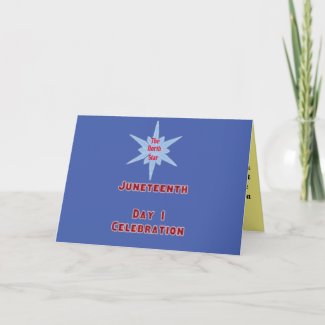
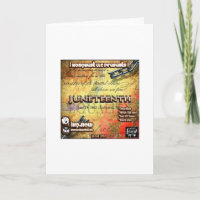 June - JuneTeenth Card
June - JuneTeenth Card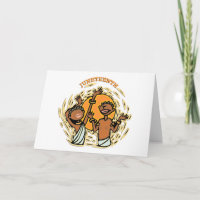 Juneteenth Card
Juneteenth Card Happy Juneteenth Holiday Card
Happy Juneteenth Holiday Card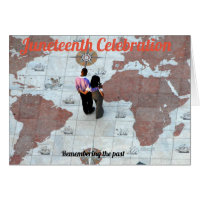 Juneteenth
Juneteenth My Father Is My Role Model All Season Card
My Father Is My Role Model All Season Card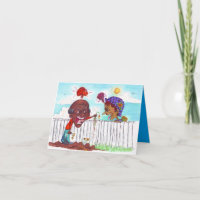 Good Fences Make Good Neighbors Note Card
Good Fences Make Good Neighbors Note Card

